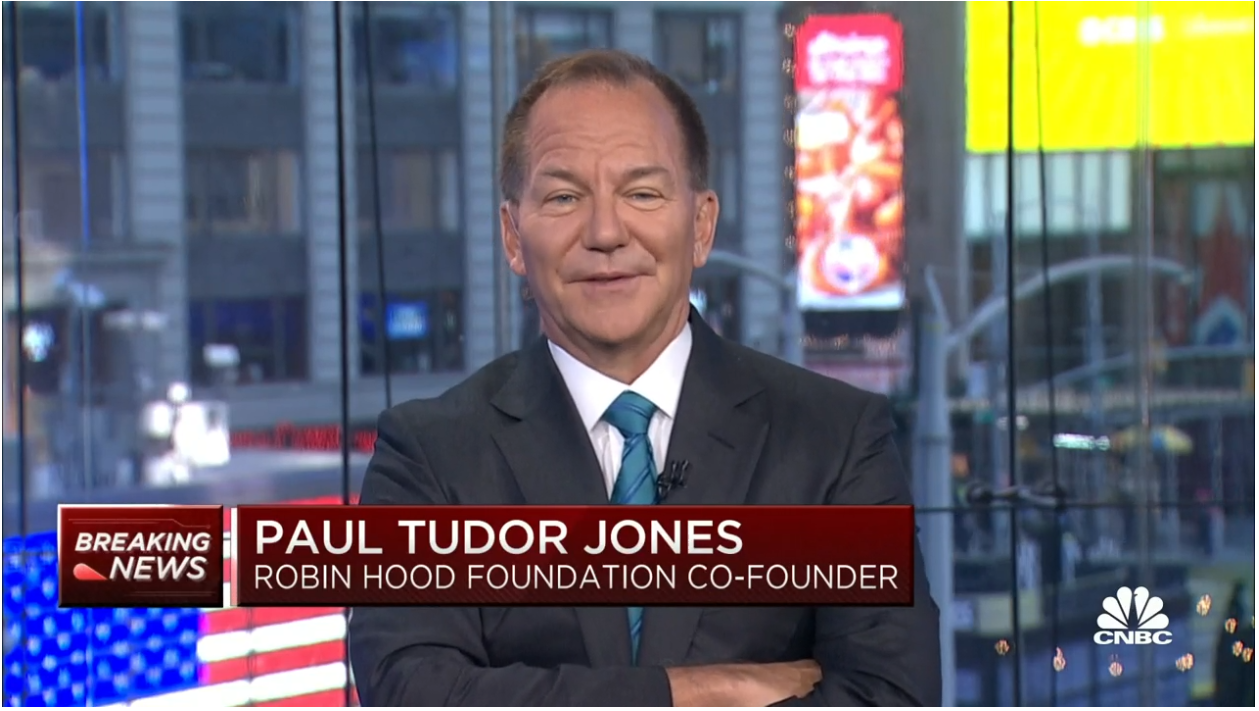Following is the unofficial transcript of a CNBC interview with Tudor Investment Corporation Founder & JUST Capital Co-Founder Paul Tudor Jones and T-Mobile Us Inc (NASDAQ:TMUS) CEO Mike Sievert on CNBC’s “Squawk Box” (M-F, 6AM-9AM ET) today, Tuesday, January 10th.
Paul Tudor Jones: Your Company’s Stock Performance Will Be Rewarded If You Do What Americans Want
ANDREW ROSS SORKIN: Welcome back to “Squawk Box.” The annual list of America’s most just companies is out. This is JUST Capital’s now ranking of corporations on issues like creating jobs, acting with integrity at the leadership level and providing benefits and work life balance.
Q4 2022 hedge fund letters, conferences and more
Joining us right now in an exclusive interview is JUST Capital's Co-Founder Paul Tudor Jones of course the legendary trader and founder of Tudor Investment Corporation. Also, here with us on set is T-Mobile CEO Mike Sievert and T-Mobile is ranked number 20 this year moving up the rankings.
It's nice to see you this morning. Paul, I'm gonna start with you in terms of how you how you see the ratings this year, and how they changed but perhaps most importantly, we were talking about this in the six o'clock hour about outperformance. How would you think about how these rankings relate to stock market performance?
PAUL TUDOR JONES: Well, the data is I think unequivocally clear on that if you take the top 100 companies what we call the JUST 100 since inception, in 2019, the JUST 100’s outperformed the Russell 1000 their peers by about 13% last year.
The JUST 100 outperformed the Russell by 3% and outperformed the NASDAQ by 20% so at least as far is the way we interpret what the American public wants and that's that's our mission is to basically poll the American public every year.
Find out what they think constitutes just behavior, and then develop a set of metrics transparently and as honestly as we possibly can and measure company's performance against the desires and wishes of the American public and it's really clear if you do what the vast majority of Americans want, your company is going to be rewarded in its stock performance.
It's also on average is going to, is going to excel in a whole variety of metrics such as return on equity, such as profit margin, such as paying dividends. The JUST 100 paid five times the amount of dividends that the rest of the Russell paid.
So, I think, you know, all the attacks on ESG and investment performance, I don't think they're looking at the data. Certainly, they're not looking at the data as it applies to JUST Capital and the 1,000 companies that we rank.
SORKIN: Mike, do you think about these lists when you manage, do you think about and do you put this in an ESG bucket? What is this to you?
MIKE SIEVERT: Well, we don't think about the list, we think about the outcomes. And first of all, Paul, thank you for your important work. Thanks for having us. Look, this is an important topic and I think it's important that we recognize that what JUST Capital is doing here is asking the American public what's important and that's what T-Mobile does.
That's the core of our business strategy is to be the best in our space and understanding what people are looking for, loving customers, putting them first changing the rules of this industry and their favorite. That's what the uncarrier is about. So if it's about really understanding people, it's not surprising that we would wind up on a list like this.
And of course, today a big part of the world wants to know that we're doing well by doing good, you know, that we're growing our business in the right way that we have our eye on sustainability and that we're leaders in DEI and that's what we are.
SORKIN: What do you make, by the way, and I'll ask Paul the same question of the pushback on ESG to the degree and I don't want to conflate the JUST Capital list with ESG but I think a lot of the issues are oftentimes described as being similar, but I would argue over the last six months to a year there's been a sort of a pushback across the board.
SIEVERT: I think it's okay to be cynical. I think it's okay to make sure that companies aren't out there do-gooding and wasting shareholder money but what Paul pointed out in his opener we agree with which is when you invest your capital in such a way that it comports with what your customers are looking for, well that's good business.
You know, that's not about trying to make some list that's actually about doing work that your customers appreciate and that they will choose you for. And for us, that's the case.
SORKIN: Hey, Paul, what do you what do you think of the conflate, I don't know if it's conflation or not of just the idea of ESG and what what you've been looking at over all these years.
JONES: Well, I think a lot of it is because ESG is incorrectly characterized certainly by what the American public tells us, it should be as SGE. Clearly when you when when environment comes first, it actually in our rankings comes way down the list.
What comes first in our rankings, 44% of our rankings are all centered around worker issues. Number one issue is are you paying a fair and living wage? That's 21% of the just ranking, and that's up from 9% just a few years ago, so Americans are becoming hyper focused as they should be on worker treatment and welfare.
Who is possibly who remotely could be against that? Obviously, the more our workers are paid, the happier they are, the more productive they are, the better society is going to be better products, more more capital, more money, more resources is good for everybody. So, you have to be really careful.
I think so much of ESG is politicized because of the fact that the environmental part of that bucket seems to drive or they would like to believe that the environmental part of it drives that when in actuality the most important thing by a wide margin is how we pay and treat our workforce.
SORKIN: Well Paul, I'll give you an example. Down in Florida, as you very well know, there was a big debate between Governor DeSantis and Disney no longer run by Bob Chapek but now run by Bob Iger over what might have been described as social issues that I would have imagined would have and the question is whether actually that would would end up on your criteria if you will.
But people, you know, at the time Disney thought that it was trying to work on behalf of its employees and then there was this sort of awoke, anti-woke back and forth, as you know, so very well.
JONES: Yeah, I'm probably not the right person to ask that question to because if you ask the American public, two-thirds of the American public want CEOs to lead with integrity and to be highly ethical. I don't think for me personally, I would disagree with the American public. I don't like to see companies involved necessarily in a variety of social issues.
I certainly don't like and most American public agrees to see companies involved in political campaigns and political contributions. For me personally and the American public agrees, it's not the purvey of corporations.
As far as Governor DeSantis goes today, he's my favorite son because in just about 20 minutes, he's getting ready to announce a very bold initiative four-year plan to restore the Everglades so please don't make me say something about my boy today when he's at the top of my list of do-gooders.
SORKIN: Mike, similarly how do you deal with the political issues that might be described as social issues at your company right now.
SIEVERT: A company like T-Mobile, we have 110 million customers from every state in the country just about and from every walk of life. So we can't afford to take sides on political issues.
What we can do is execute against our core values. And you know, that's what I think is consistent with a lot of the measures on this list. Look at the issue that Paul just talked about worker pay, you know, we were one of the first companies to come out with a nationwide $20 minimum wage over two years ago.
We've been a consistent strong payer. Yesterday, I announced because of inflation, a one-time $1,000 check to every single one of our workers nationwide, including the people that answer the phone or the people that man our stores, which you know who many of whom are people who this is going to make a big difference for.
We also just released a one-time 50% bonus in the stock grants and stock grants at T-Mobile are for every single employee. So everyone's an owner and that means when you work with us, you're dealing with somebody who acts like an owner and this year we put that 50% higher because we know inflation—
SORKIN: Where do you stand on political donations, and I ask because you're in a regular, relatively regulated business.
SIEVERT: We are.
SORKIN: And you have to deal with politicians a lot.
SIEVERT: We do and our employee PAC makes employee makes donations politically, but we do it roughly 50/50 across both sides of the aisle and it's not really about social issues or broader national political issues. It's about making sure that our people have a chance to educate lawmakers on issues that affect our industry.
SORKIN: Hey Paul, Mike just mentioned the “I” word inflation also wages which are pushing up inflation. I want to get your thoughts on where the markets are right now and what you think Jay Powell who we're going to be hearing from I believe at about nine o'clock this morning, he's making a speech may or may not say or do as ‘23 rolls on here.
JONES: I don't have any great insights into what he's going to say. I think it's a very difficult situation that he's in. He's obviously trying to land a capsule on the moon as perfectly as he can and what is obviously the most challenging economic environment we've had in 40 years.
I would say, I would say it's it's made even more complicated by this warm weather we’ve got, right? We're going to have really high economic activity in the first quarter when seasonally we don't. There's a huge amount of savings that consumers have from all the Covid relief bills, and the stimulus that was applied both from a fiscal monetary standpoint.
So he's faced with that very difficult proposition of working that down without breaking things. And I think it's going to even be more complicated by the fact if I just look at kind of our internal work on flows for the stock market, you've probably got something just under a trillion dollars of excess demand in US stocks.
Where is the selling going to come to offset that that demand is coming from buybacks from the corporate line item, from some combination of buybacks and M&A, and that's, you know, that's a significant amount, everything being the same.
You’d think the stock market would be up 7 or 8% this year. Obviously, the selling either the stock market will be up 7or 8% or Jay Powell, if he can't get inflation under control, will raise rates up to a point that creates enough of an economic contraction to cause retail to offload some of the stocks that they bought in ’21, ‘20 and ’21.
Which is obviously a record it'll require something negative to happen to create the stock market to go down meaningfully, he will have to either inflation would have to be too high or it would have to over tighten to create something some major economic contraction to make the market go down.
Absent that, the market is going to stay the stock market is gonna stay strong. Absent that, you would think that wages will stay firm so it's it's it's a difficult—
SORKIN: But Paul, what we’re trying to figure out is the absent part of it. Is it going to be absent that?
JONES: I kind of think that I kind of think that they'll stop short of breaking the economy. A lot of it depends on how inflation plays out. Again, we haven't we've only got really one other period in time in the 70s in very different circumstances in some situations and very similar in the others. And it's, it's I'd like to give you a better answer. I don't have a crystal ball on this one.
JOE KERNEN: We we don't like certain aspects of what the Fed has to do to get inflation under control, one of which is looking askance at wage gains. Like by definition, it's like oh no, there's wage gains. So please don't yell at me and say that your daughter hates me or anything but let's let's say—
JONES: It was my favorite person to talk with.
KERNEN: Let's say let's say you set market rates all the companies you deal with set market rates above where they should be to bring in workers because your good intentions once again, you have good intentions.
So, you exacerbate the entire wage price spiral which causes the Fed to go much higher than it would have had to go in the first place which causes a recession which many more people than you helped with the higher market higher than market wage gains aren't hurt by the recession, in the subsequent recession. Does that ever enter your mind?
JONES: It absolutely enters my mind. It's a paradox isn't it? It's a conundrum.
KERNEN: It is.
JONES: Having said that, I do think most of the inflation that we're seeing right now is not because of the fact that the American worker is getting their fair share of the pie, right? If you think about 50 or 60 years ago when we had a much more resilient middle class than we do today, profit margins were six and a half percent.
They're close to 12 today, so it's not so much that American workers are getting some extraordinary amount of what all our efforts i.e. corporate revenue, what the entire stakeholders are capable of generating.
So I think the inflation that we have right now is because primarily because of extraordinary fiscal stimulus and extraordinary monetary stimulus not because of the fact that workers are getting a fair share for a change.
So that would be the way out to answer your question, but clearly, what I get excited about when I see the announcement of Bank of America paying a $22 minimum wage for all their employees on the way to 25, that's a good thing for America, right? That creates more demand by those employees and creates a bigger path for all of us.
SORKIN: Well let me ask let me ask Mike that question. Are you seeing more demand? And is this inflation hitting people? I mean, the cost of the phone has gone up. What do you what are you actually seeing in the store right now?
SIEVERT: You know, it's a good time to be in wireless right now and part of it is that we're in a category that people absolutely want. That makes it very different than the, for example, the ’08 recession where we weren't all, you know, using our smartphones the way we are today.
SORKIN: But is there a distinction between, I mean, look, we've heard even from Amazon that people were buying bigger TVs, they've downgraded to buying to buying, you know, marginally smaller TVs.
SIEVERT: We’re side eyeing the future because like everyone, we’re worried about what might be coming. We don't see it as a foregone conclusion that a recession is coming. But if when it does, we're ready. What we're seeing today is people are actually buying up our rate card. Our most popular plan is one of our highest end plans because they can't get enough of the product that we sell in this industry.
SORKIN: And that's the monthly rate plan.
SIEVERT: Absolutely.
SORKIN: What about the devices? Everybody wants to know about the devices what's selling and what's not.
SIEVERT: Same and you know the most popular devices are the iconic high-end smartphones from both companies and so look our categories fortunate that what we're selling is very important to consumers but also within that category, there very well may be a flight to value.
There very well might be a questioning over this next year whether people have the right setup and we're ready for that you know as T-Mobile which is always been positioned to take care of people with variable—
SORKIN: I got to ask because people are always focused on Apple and inventory and since you're on the other end of it, you know about the inventory. Is it caught up or not? What do you see?
SIEVERT: We're in much better shape now than we were a couple of months ago.
SORKIN: So that means that you have all the, it’s everything you need?
SIEVERT: Yes.
BECKY QUICK: You mean demand has come down or supplies have come up?
SIEVERT: It just means that we’re in stock now so if you come to our website and you want an iPhone 14 Pro, we got you.
SORKIN: Okay, but that's also interesting for investors who thought maybe there was some some pickup or some catch up that was gonna happen. You’re saying the catch up has happened?
SIEVERT: What I'm saying is we're in stock now, there might have been a transference of some demand from Q4 into Q1. We’ll have to wait and see what what happens.
SORKIN: Mike, thank you for coming in. Paul, great to see you. Thank you both for bringing us the JUST 100 list and congratulations for being on it.













